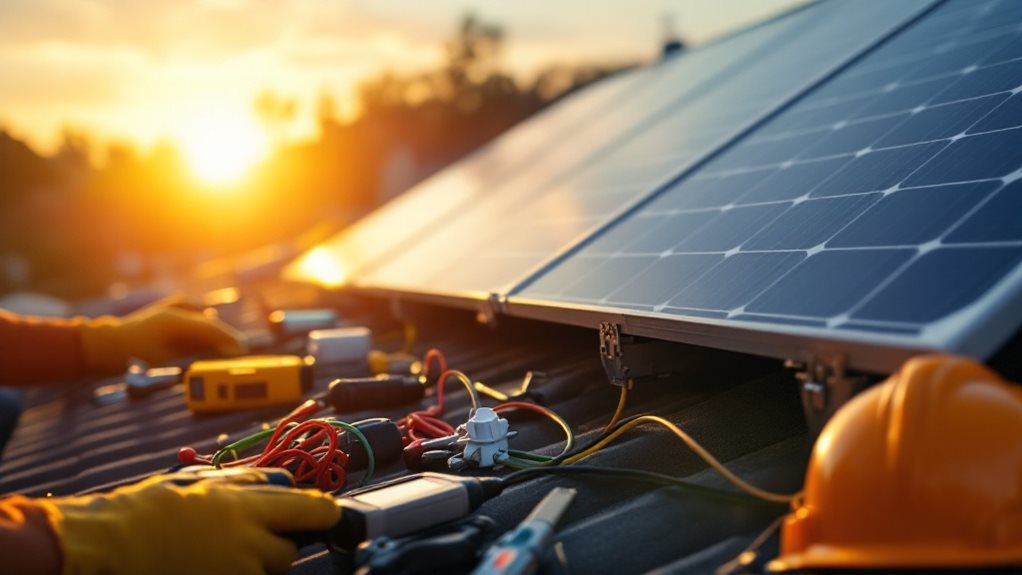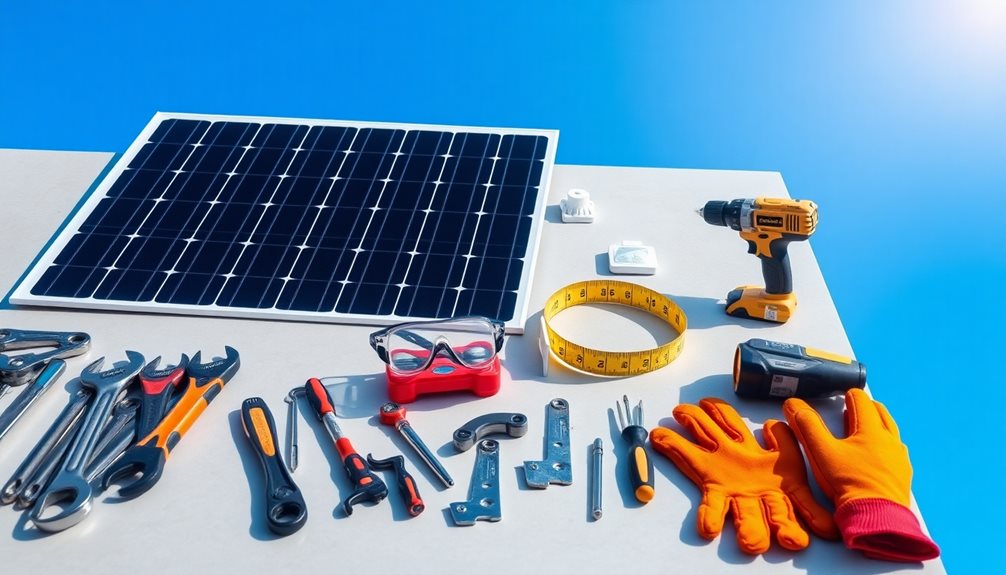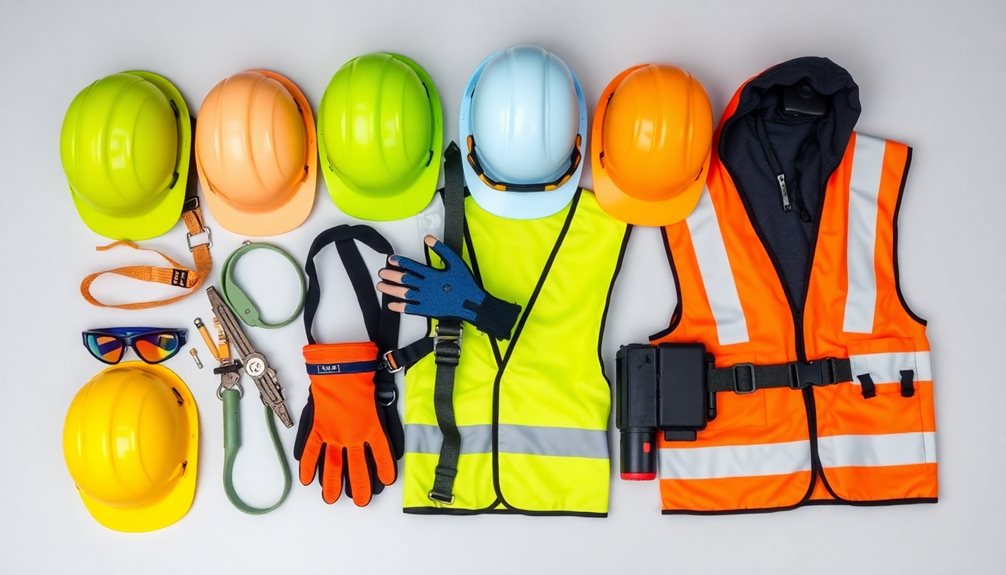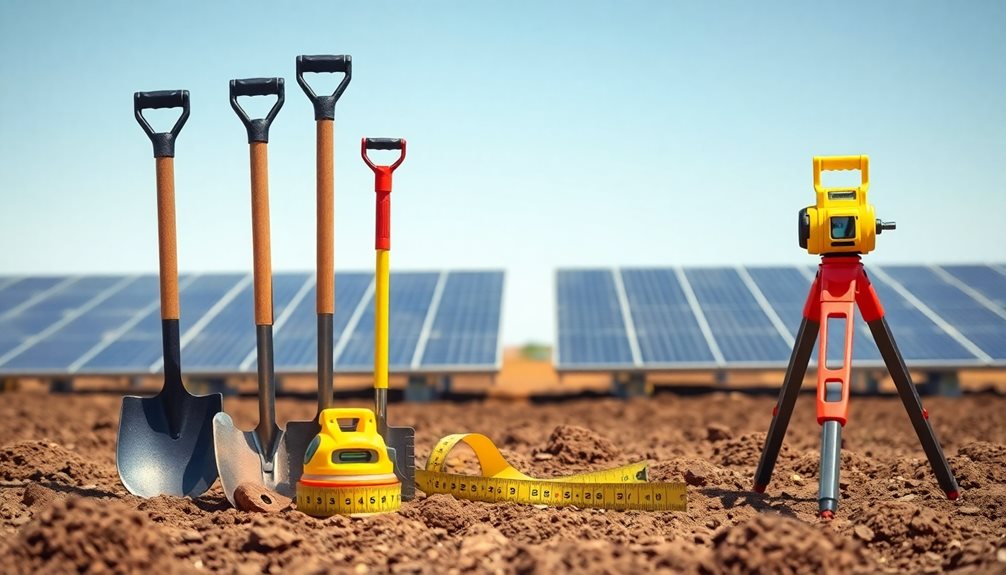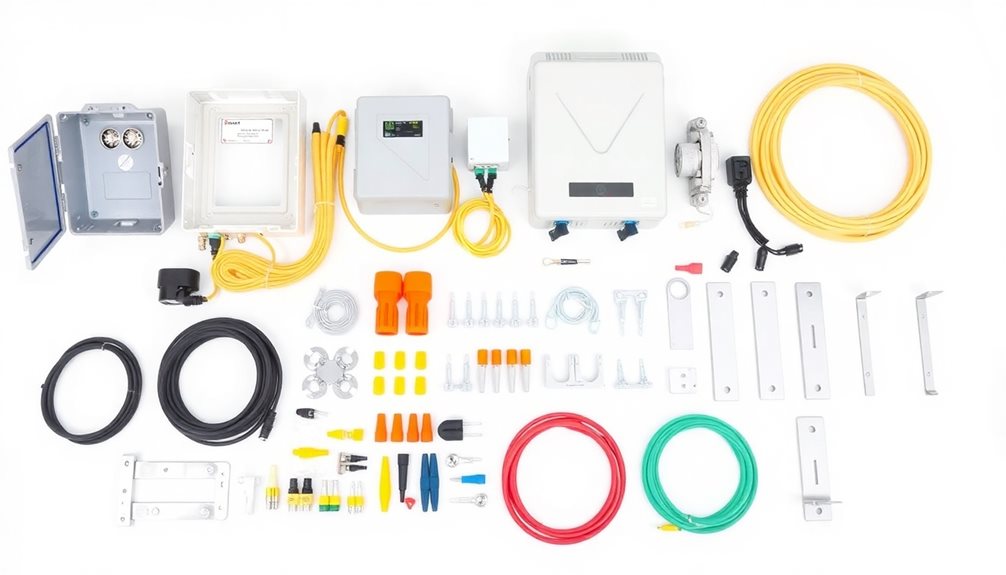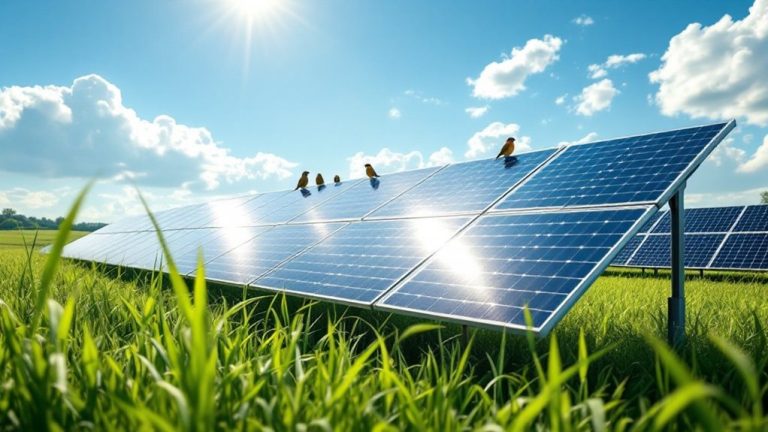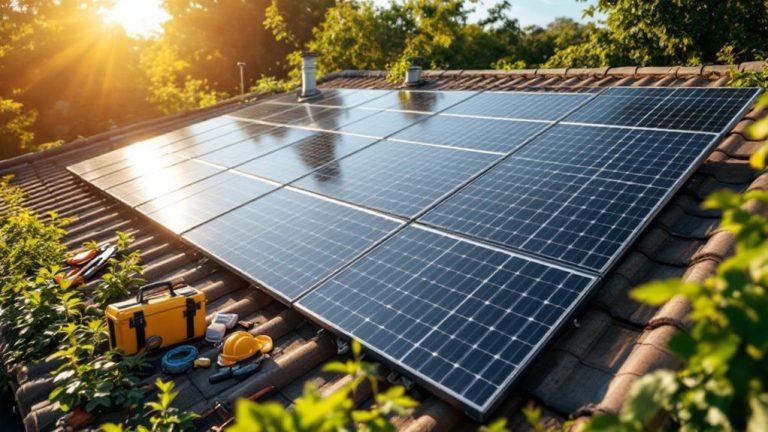Installing solar panels necessitates a selection of specialized tools and equipment to achieve precise, safe, and efficient outcomes. Essential tools include battery-powered drills, a variety of screwdrivers, and ladder extensions, complemented by safety gear such as hard hats and harnesses to guarantee conformity with safety standards. For site preparation and electrical installation, tools like multimeters, wire testers, and thermal imaging cameras play a pivotal role in sustaining quality and precision. Key installation materials such as solar glass, aluminum frames, and mounting systems are indispensable. Each tool and material serves a special purpose in the thorough installation process. Explore further to uncover deeper insights.
Expert Highlights
- A variety of screwdrivers and a battery-powered drill are essential for fastening components.
- Safety gear like hard hats, safety glasses, and harnesses ensure safe installation practices.
- Multimeters and wire testers are crucial for verifying electrical connections and system performance.
- Use robust mounting systems for the secure attachment of solar panels to roofs, ground, or poles.
- Thermal imaging cameras are needed to detect overheating or faults in the solar panel system.
DIY Tools for Installation
When undertaking a DIY solar panel installation project, an extensive set of both basic power and specialized tools is indispensable. A battery-powered drill, screwdrivers, and a hack saw cater to essential tasks such as drilling, fastening, and cutting mounting rails. A ladder extension 3ft above the roof is crucial for ensuring ladder safety during installation. Specialized tools like a digital multimeter and conduit bender guarantee precise electrical system setup, while safety equipment, including fall protection gear and insulated tools, safeguards the installer.
Key Installation Materials
In the domain of solar energy projects, understanding key installation materials is fundamental to ensuring a successful and efficient setup. Solar components, like solar glass, EVA, and a robust aluminum frame, protect and stabilize the panels. Solar glass, serving as the outermost layer of the solar panel, must possess both strength and reflectivity to optimize performance; its primary function is to shield the solar cells from adverse weather conditions, dust, and dirt. Effective mounting systems with roof, ground, or pole options provide tailored support. Additionally, essential accessories, such as clamps, grounding lugs, and precise installation hardware, further enhance system reliability.
Essential Safety Equipment
Having explored the pivotal components required for solar panel installation, attention must also be directed towards the safety equipment that safeguards both the installer's protection and the project's triumph. The following tools guarantee safety across various aspects, from head to toe protection to effective fall arrest systems essential for secure solar panel installation on rooftops: Proper training and certification ensure that installers adhere to safety protocols and operate equipment efficiently.
| Equipment |
Purpose |
| Hard Hats |
Protect against falling objects |
| Safety Glasses |
Shield eyes from debris |
| Harnesses |
Prevent fall-related injuries |
| Lifeline Ropes | Secure installers during installation
Vital Electrical Tools
Equipping oneself with the right electrical tools is crucial for the successful installation and maintenance of solar panels. Essential instruments such as multimeters and wire testers are needed for evaluating electrical parameters and cable integrity. Moreover, having the appropriate tools not only ensures safety but also facilitates efficient and precise installations for optimal system functionality. Thermal imaging cameras and ground testers enhance performance and safety. Connection tools like wire strippers and crimpers, along with torque wrenches and ratchets, guarantee precise assembly and secure installations.
Tools for Site Preparation
Effective site preparation is paramount to successful solar panel installations, necessitating a variety of specialized tools.
A tape measure and shading assessment tools evaluate the site's spatial and solar potential, while multimeters inspect electrical systems. A digital multimeter is crucial for ensuring the quality of power emitted by solar panel cells. Levels and various measuring tools guarantee precise fitting for ideal performance. These tools assure precision and quality, fostering trust within the community of diligent solar professionals and clients alike.
General Equipment Needs
To guarantee successful solar panel installations, professionals must have an exhaustive array of general equipment that meets both installation and safety standards. Essential components include solar panels and power inverters for energy conversion, while roof anchors and mounting brackets secure structural integrity.
Electrical elements such as wire, connectors, and conduit complete the connectivity. Safety measures, including helmets and harnesses, safeguard technicians during complex installations.
Must-Have Accessories
With a thorough understanding of general equipment needs established, professionals can achieve ideally functioning solar installations by incorporating a selection of must-have accessories. Essential safety equipment such as fall protection systems and high-visibility jackets guarantee worker security.
Specialized tools like conduit benders and solar panel hangers facilitate efficient installation. These indispensable accessories enhance both the safety and efficacy of solar panel installation projects, promoting a seamless integration into the renewable energy landscape.
FAQ
What Factors Should Be Considered When Choosing a Solar Panel Installation Site?
Selecting a solar panel installation site requires evaluating site topography, accessibility, ground conditions, shading, solar energy potential, regulatory compliance, and community factors. These elements guarantee the project's technical feasibility, cost-effectiveness, and community acceptance for successful implementation.
How Do Weather Conditions Affect Solar Panel Installation Timelines?
Weather conditions profoundly impact solar panel installation timelines by introducing potential safety hazards and scheduling delays. Installations often face interruptions during heavy rain, snow, or extreme temperatures, necessitating careful planning and flexibility to solidify project completion and worker safety.
What Is the Average Cost Range for Installing Solar Panels?
The average cost range for solar panel installation varies from $16,500 to $25,000, with a national average of $21,816 for a 7.2 kW system. This investment contributes to sustainable energy solutions, appealing to environmentally-conscious communities.
How Can I Optimize the Efficiency of Installed Solar Panels?
To optimize solar panel efficiency, regularly clean and maintain the panels, guarantee correct positioning, and incorporate advanced technologies such as microinverters. Monitor system performance actively and conduct professional maintenance to verify peak functionality and community environmental contribution.
What Are the Maintenance Requirements for Solar Panels Post-Installation?
Post-installation, solar panels require biannual cleaning to clear dirt and pollutants, and annual professional inspections to guarantee efficient operation and safety. Regular maintenance, including damage repair and specific problem-solving, secures longevity and prime performance, fostering sustainability.
Experts Final Thoughts
In summary, the installation of solar panels necessitates a thorough array of tools and materials to guarantee a successful and safe setup. From DIY tools to indispensable electrical instruments, each category plays a pivotal role in the seamless integration of solar technology. Safety equipment remains paramount, emphasizing the necessity for protective gear alongside technical equipment. By understanding and utilizing these essential tools and accessories, the effectiveness and durability of the solar panel system can be effectively maximized.





